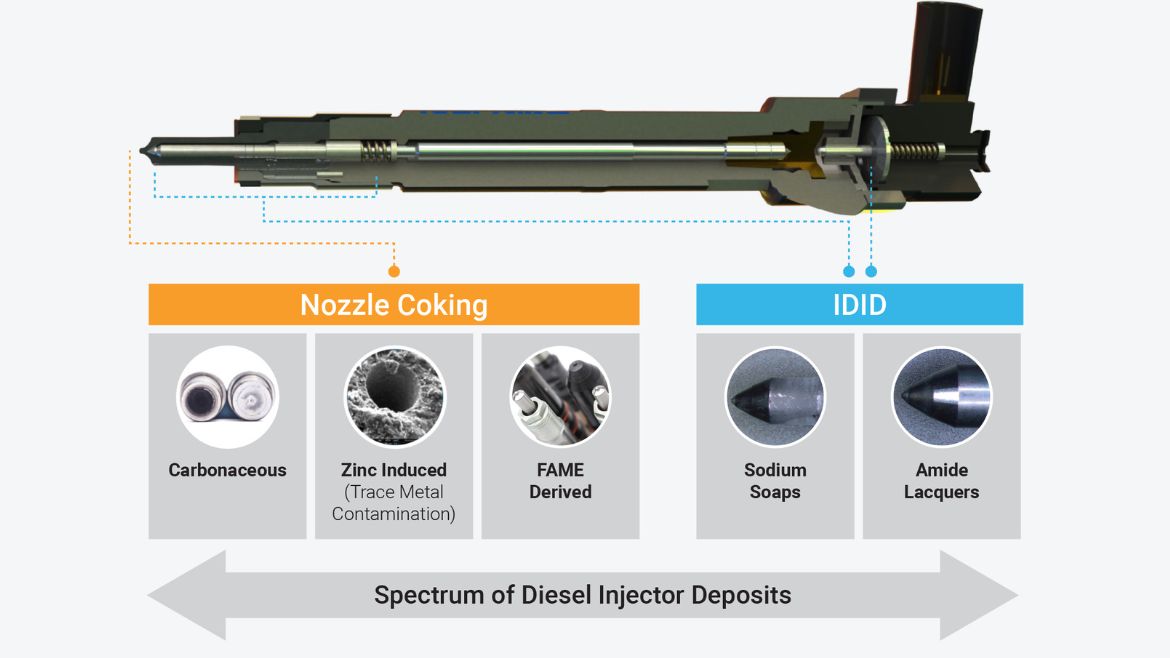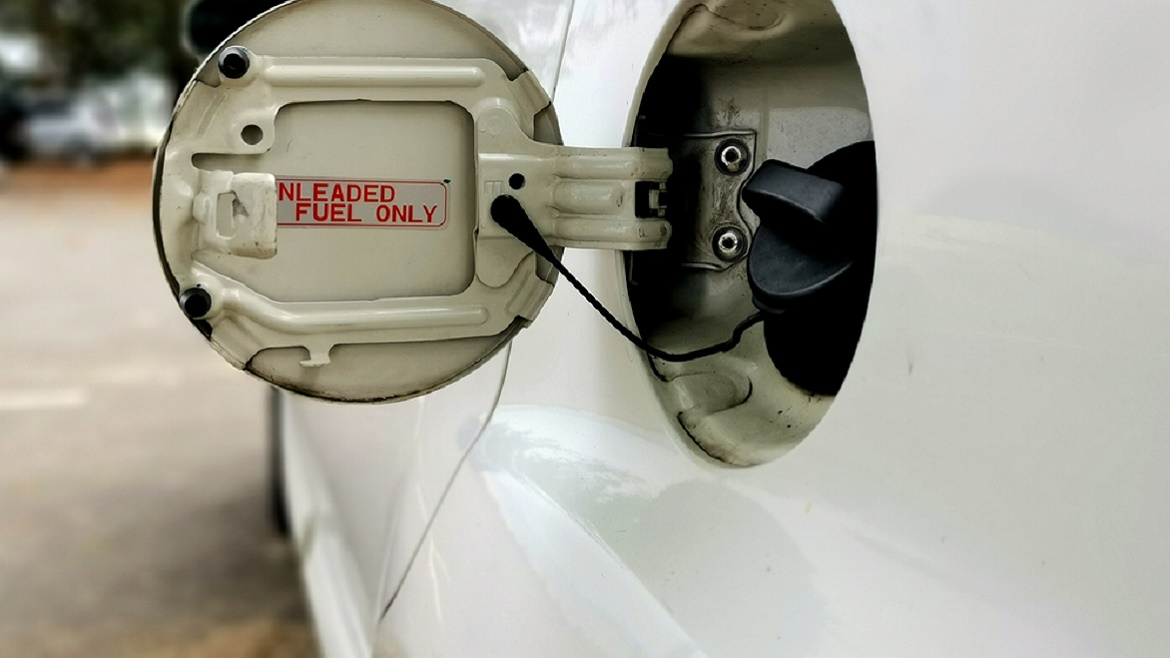Global concern about climate change has driven efforts to improve the efficiency and reduce emissions of diesel internal combustion engine (ICE) vehicles. Tighter regulations are pushing Original Equipment Manufacturers (OEMs) to enhance diesel ICE efficiency to comply with CO2 targets and minimize harmful emissions.
Modern diesel vehicles face new challenges, such as tighter emissions targets and harsher operating conditions. Consequently, understanding the significance of diesel fuel quality and the role of fuel additives in protecting vehicle performance has become increasingly critical for the latest engine hardware.
Both light-duty and heavy-duty diesel engines use precise fuel injection systems with tight tolerances and narrow fuel spray channels to optimize combustion to minimize emissions and maximize efficiency. However, deposits in diesel engines, particularly in nozzle holes and other injection system components (see figure 1), can cause drivability problems and downtime, increase emissions, and reduce efficiency. These issues are expected to worsen with the introduction of new Euro 7 and EPA emissions regulations, which will likely result in even more highly engineered and sensitive fuel injection equipment.
Diesel vehicles also utilize complex and sensitive aftertreatment systems, including oxidation and nitrogen oxide reduction (`deNox') catalysts. Diesel Particulate Filters (DPFs) filter out harmful particulate emissions from the exhaust pipe by collecting soot and ash. Over time, these filters can become blocked, necessitating periodic regenerations or, in severe cases, replacement or cleaning. The quality of combustion in the engine directly impacts the amount of soot buildup in the particulate filters, which can lead to more frequent regenerations, increasing fuel consumption.

Fuel Quality
Fuel quality is influenced by several factors, including specifications such as EN590 in Europe and D975 in the US, which outline important characteristics for diesel fuel like sulfur levels, oxygenate content, biofuel content, and oxidation stability. While all fuels must meet these standards, not all fuels are created equal. Leading fuel marketers enhance their products with additives to boost performance and differentiate their offerings. These additives provide cost-effective enhancements such as deposit control, corrosion protection, improved cetane number, reduced engine friction, and anti-foaming properties.
Diesel fuel blend components, such as fatty acid methyl ester (FAME) and hydrotreated renewable diesel, present unique challenges for diesel engines. FAME blends are commonly used in Europe and globally, while hydrotreated renewable diesel is derived from biogenic sources. These blends can impact engine performance, fuel stability, and emissions, requiring careful management to ensure optimal engine operation.
Different blends of mineral diesel, biodiesel, and renewable feedstocks are used globally, leading to several types and characteristics of deposit buildup in diesel fuels. Even trace levels of fuel contamination by trace metals and other substances can adversely affect modern fuel injection equipment. Extensive research and field experience have shown that all types of diesel fuel, regardless of their composition, need high-performance deposit control additives to prevent the formation of harmful deposits in injectors.
Importance of Diesel Fuel Additives
High-performance diesel additives are essential for protecting modern vehicle equipment and ensuring optimal operation. They play a crucial role in emissions compliance, engine protection, and compatibility with all vehicle and engine types. These additives effectively clean injectors and fuel systems by removing existing deposits and preventing future buildup. Consequently, they offer significant advantages such as power recovery, enhanced fuel economy, and restored emissions performance. Diesel additives also address mechanical issues caused by deposit accumulation, ensuring smoother and more efficient engine operation.
Deposit control additives (DCAs) are vital components in diesel additive formulations, providing key performance attributes. Modern diesel engines are extremely sensitive to deposit buildup due to factors like increased injection pressures, smaller spray hole channels, and reduced internal clearances. To ensure optimal performance, it is important to prevent or remove injector nozzle coking deposits, enabling precise spray patterns over multiple fuel injection cycles. Deposits can also form within internal moving parts like control valves, causing issues such as rough engine running, excessive noise, reduced fuel efficiency, and potentially costly injector replacement and downtime. Hence, deposit control additives are essential in preventing and removing deposits across all diesel fuel types.
Preventing and removing deposits enhances vehicle performance, restores fuel economy and power, and optimizes fuel spray pattern, timing, and injection quantity. Lubrizol's Zer0Evo™ deposit control additive has been proven to increase power compared to a vehicle in "as new" condition during testing. This power increase, known as the "Powergain" phenomenon, is achieved by improving fuel flow through the injector nozzle holes, reducing turbulence and cavitation, thanks to the unique properties of Lubrizol's DCA.
The cetane number is a key indicator of diesel fuel combustion speed. Regional base fuel specifications determine the required cetane number. Cetane improver additives can be used in fuel additive packages to enhance performance and improve the cetane number of the base fuel when needed.
Diesel fuel additive packages usually include corrosion protection to prevent engine component corrosion. They also contain anti-foam components that reduce fuel foaming during tank filling. This allows for faster fill-ups and delivers more fuel per customer visit.
Aftermarket diesel fuel additives
Aftermarket diesel fuel additives provide a convenient way for end users to enhance vehicle performance. These concentrated formulas can be directly added to the diesel fuel tank and come in various forms, including "One Tank" solutions that quickly remove deposits and "Continuous Use" products that maintain diesel fuel quality over time. Using these additives allows users to experience significant benefits without relying on the additive content of bulk diesel fuel purchased from the pump or commercial suppliers, which can vary or may contain no additives at all.
Summary
High-performance diesel additive packages offer numerous benefits for modern vehicles. These additives are essential for preserving the advantages of advanced diesel engine designs, ensuring efficient operation, reducing maintenance costs, maximizing performance, and improving the quality characteristics of diesel fuel. Lubrizol's fuel additive packages are expertly formulated to protect diesel engines and enhance fuel quality.
Lubrizol's fuel additive packages, such as the Zer0Evo™ deposit control additive, exemplify advanced technology to address the specific challenges posed by modern diesel engines and varying fuel compositions. By using these additives, vehicle owners can achieve better power, fuel economy, and emissions performance, ensuring their engines run smoothly and reliably. Additionally, these additives are designed to be backward compatible, offering benefits to older diesel engines by helping clean deposits, reduce wear, and maintain optimal performance without causing harm.
For more information about these packages, please contact your account manager.





.jpg?h=658&w=1170&la=en&hash=2ABC1BD34C86459161E1A5564A6B790A)



